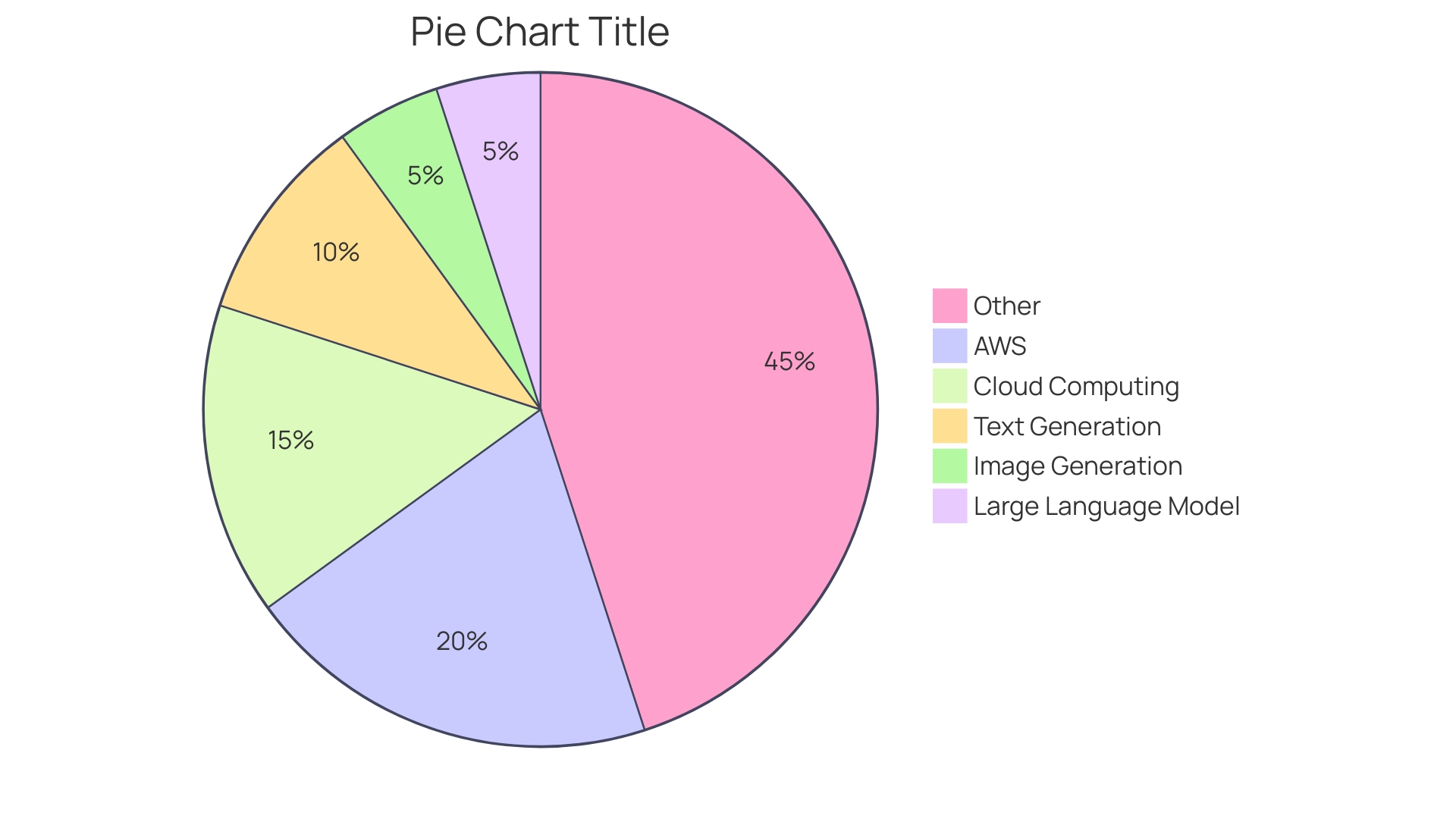Introduction
Cloud computing has revolutionized the way businesses operate, offering scalable and flexible solutions for various needs. When it comes to cloud platforms, two major players dominate the market: Azure and AWS. But how do these platforms compare in terms of service offerings, pricing models, security features, and hybrid cloud solutions?
In this article, we will provide a comprehensive overview of Azure and AWS, highlighting their strengths and helping decision-makers choose the ideal cloud solution for their business. So, let's dive in and explore the world of cloud computing with Azure and AWS.
Service Offerings Comparison
Selecting the suitable platform between AWS and Microsoft's cloud solution hinges on understanding their service offerings, which cater to a spectrum of business requirements. Azure's suite encompasses services such as Azure Virtual Machines, Azure Storage, Azure Networking, Azure Databases, and Azure AI, each tailored to enhance compute, storage, networking, databases, and AI functionalities. AWS responds with Amazon EC2, Amazon S3, Amazon VPC, Amazon RDS, and Amazon AI services, also covering the essential areas for a strong infrastructure.
A real-world example of optimization in the digital realm is GoDaddy, a global leader with over 20 million customers, which has streamlined its batch processing jobs by adopting a methodical 'seven layers of improvement opportunities.' This approach emphasizes how businesses can harness online services to enhance efficiency and performance.
Canalys, a highly regarded analyst firm, reports that AWS, Google Cloud, and other providers collectively control 67% of the worldwide cloud infrastructure market, with AWS leading the way since its establishment in 2006. This leadership status translates to a matured platform known for stability, reliability, and security. Furthermore, Five advises that AWS often provides a more user-friendly experience, featuring an intuitive interface that eases the learning curve for new users, which is crucial when training teams and deploying technology.
When comparing AWS and another cloud computing service, it's not just about the services they offer, but also how they align with your business's unique needs. Performance, features, and pricing are critical factors in this evaluation. Considering AWS's market leadership and the wide range of services offered by Azure's competitor, decision-makers need to evaluate the platforms based on their strategic goals in order to find the optimal solution.

Pricing Models Comparison
Determining the most cost-efficient platform for hosting between AWS and another cloud provider necessitates an in-depth analysis of their respective pricing models. Both providers implement a pay-as-you-go structure, which is particularly advantageous for organizations with variable workloads, allowing them to scale resources and costs in alignment with their operational demands. The platform sets itself apart with tools created to predict costs, giving businesses the ability to adjust their expenses. These calculators assist in estimating the financial implications of their usage, optimizing for both performance and cost-effectiveness.
AWS embraces a similar approach, eliminating initial costs and providing businesses with cost management resources. These tools facilitate precise cost predictions and spending oversight. The key to maximizing the financial benefit lies in understanding the frequency of usage and the appropriate unit of measure for conducting a cost analysis. This becomes crucial when evaluating the total cost of ownership over time.
Microsoft has recently improved the value proposition of its cloud platform by eliminating egress fees for data transfer, a move that aligns with the upcoming European Data Act and illustrates their commitment to transparency and customer-centric pricing. The waiver of these charges applies globally and stands as a testament to Azure's dedication to providing a frictionless and cost-effective experience in the computing environment.
Additionally, Microsoft's unveiling of Fabric as a unified data analytics platform signifies their ongoing investment in enterprise-level data solutions, potentially positioning them as a formidable contender against established players like Databricks.
The choice between AWS and another cloud service provider should be informed by a thorough comparison of their pricing strategies and a consideration of your organization's specific requirements. To aid in this complex decision-making process, it's advisable to leverage the sophisticated analytics and insights offered by industry experts, such as Canalys, to ensure a choice that aligns with your strategic financial objectives and technological needs.

Security Features and Compliance
Ensuring the highest level of protection is crucial in selecting a provider for cloud services, and both AWS and another leading cloud provider have demonstrated a strong commitment to safeguarding customer data with their comprehensive security offerings. The protective measures of the cloud platform include network security groups and the Azure Active Directory, which enhance identity and access management. It also features DDoS protection, alongside encryption of data both at rest and in transit, satisfying a variety of industry standards such as GDPR and ISO 27001.
Similarly, AWS brings to the table its Identity and Access Management (IAM) and virtual private clouds (VPC) for enhanced network isolation. AWS Shield offers DDoS defense and, similar to AWS, it also incorporates encryption features to safeguard data while at rest and during transmission. Compliance with industry standards, including GDPR, ISO 27001, and HIPAA, is also a strong suit for AWS.
The choice between Azure and AWS for features and compliance should be influenced by the specific demands of your business. For instance, the importance of examining published Amis for potential vulnerabilities was highlighted in a case where AWS-owned Amis were not affected by certain issues, underscoring the need for customer vigilance.
In the wider framework, Microsoft's recent shift to a new cybersecurity approach highlights the continuous development of the industry, as they incorporate automation and AI to improve the protection of their cloud services. This approach aims to hasten the repair of vulnerabilities, enhance default safety settings, and fortify infrastructure against potential compromises.
Moreover, the current landscape of cybersecurity is shaped by decades of evolution, as noted by industry experts. Understanding the depth of today's solutions is crucial in comprehending the history of iterative improvement. By combining AI and the pooled power of data from different telemetry sources, Microsoft is positioning itself to foresee and neutralize emerging threats effectively.
When deciding between AWS and another cloud platform, businesses must evaluate the security features and ensure that the chosen platform is in line with their compliance and security strategies.
Hybrid Cloud Solutions and Integration
Hybrid cloud solutions are increasingly becoming a cornerstone for businesses aiming to bridge their on-premises infrastructure with the expansive capabilities of the cloud. Two giants in the field, AWS and another cloud provider, offer robust services to enable seamless hybrid deployments.
The company introduces Azure Arc and Stack to the table. Arc extends the management capabilities of Microsoft's cloud platform to any infrastructure, facilitating a multi-cloud and edge computing strategy that aligns with the demands of a global and diverse enterprise environment. Azure Stack, conversely, is designed for organizations interested in running Azure services directly on their own hardware, providing a consistent hybrid platform that leverages the same application model, self-service portal, and APIs available in Azure's public cloud.
AWS counters with AWS Outposts, which allows businesses to run AWS services on-premises, creating a truly consistent hybrid experience. The infrastructure is fully managed by AWS, ensuring a seamless extension of AWS services into any data center. AWS also supports a myriad of integration options like AWS Direct Connect and AWS VPN, offering secure connectivity between on-premises networks and AWS's environment.
The choice between Azure and AWS for hybrid capabilities should be influenced by an organization's current architecture, scalability needs, and the level of integration and management features needed. For instance, a study on the financial advantages of cutting-edge cloud management techniques suggests that thriving hybrid multi-cloud businesses typically integrate network, safeguard, and cloud-based operations into a unified operational hub. Moreover, the current trends in cloud security indicate that a hybrid, multi-cloud strategy is preferred by 78% of organizations, with a notable 43% utilizing a combination of cloud and on-premises infrastructure.
Real-world applications demonstrate the strategic benefit of hybrid solutions. IFCO, for instance, utilized Rackspace Technology's expertise to navigate their journey in the clouds due to their limited IT department and the need for experienced guidance. This collaboration highlighted the importance of a trusted partnership and customer-centric focus in implementing a hybrid environment.
As businesses like 4Wall Entertainment modernize IT infrastructures, the hybrid cloud model presents an opportunity to transform business processes and enhance team cooperation while optimizing control, flexibility, and costs. Choosing the right hybrid solution is a step towards fostering innovation and maintaining a competitive edge in today's digital marketplace.
Conclusion
In conclusion, when comparing Azure and AWS, it is important to consider their service offerings, pricing models, security features, and hybrid cloud solutions. Azure offers a comprehensive suite of services, while AWS provides a wide range of services for a robust cloud infrastructure. Both platforms have pay-as-you-go pricing models, but Azure stands out with tools for expense forecasting and abolished egress fees for data transfer.
Both Azure and AWS prioritize security with features like encryption, network security groups, and compliance with industry standards. For hybrid cloud solutions, Azure offers Azure Arc and Azure Stack, while AWS provides AWS Outposts and various integration options. Decision-makers should evaluate these factors against their strategic objectives to choose the ideal cloud solution that aligns with their business needs.




